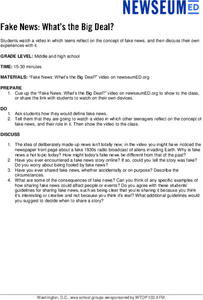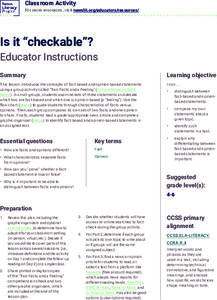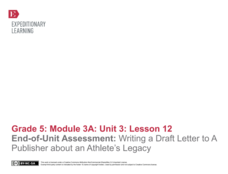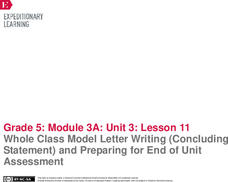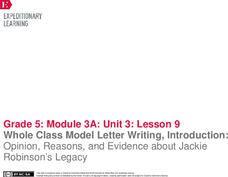Newseum
Media Ethics: Fairness Formula Starts With Accuracy
As part of a study of media ethics, young journalists apply a fairness formula to news reports. They look at accuracy, balance, completeness, detachment, and ethics to determine if the reporting is fair.
Newseum
Fake News — What's the Big Deal?
In a time of fake news and alternative facts, young people must have the ability to identify it and its role. Scholars watch a video of teens reflecting on the concept of fake news and the impact of sharing fake news stories. They then...
News Literacy Project
Is It “Checkable”?
Upper elementary scholars test their checking skills with a lesson that challenges them to distinguish between fact and opinion. First, the class takes part in a discussion regarding a helpful flow chart. Next, learners follow the flow...
News Literacy Project
News Goggles: Lionel Ramos, Oklahoma Watch
Given all the recent criticism of the news media and coverage, it's crucial that young people are given the tools they need to evaluate what they see, hear, and read about current events. A video interview from "News Goggles" introduces...
Nemours KidsHealth
Screen Time: Grades K-2
Two lessons encourage class members to go screen-free. The first lesson plan challenges two teams to create a list of screen-free games. The team with the most ideas wins. Individuals then draw a picture of themselves doing one of the...
EngageNY
Mid-Unit 3 Assessment, Part I: Short Constructed Response and Organizing Notes for a Public Speech
It's time to put pen to paper. Scholars complete the first part of the mid-unit 3 assessment, writing a short constructed response about international aid following a natural disaster. Next, pupils use informational texts and note...
EngageNY
Researching about the Red Cross, Continued: How Did the Red Cross Aid Haiti After the 2010 Earthquake?
What a puzzle! Scholars participate in a Jigsaw discussion within their expert groups, determining the gist of an article about the 2010 Haiti earthquake. As they read and discuss the article, they record thoughts on their note catchers.
EngageNY
Researching about the Red Cross, Continued: Who Is the Red Cross and What Does This Multinational Organization Do?
Code red! Learners read an informational article about the Red Cross, discussing the gist of the text in small groups. On a three-column note catcher, pupils take notes to show how the Red Cross functions as a multinational aid...
EngageNY
Researching about the Red Cross: What Is a Multinational Aid Organization?
Lend a helping hand. Pupils read two informational articles about international aid organizations and how they help areas affected by natural disasters. Scholars attempt to uncover the gist of each text, discussing their thoughts in...
Bonneville
The Problem of Plastic Trash Islands
Trash collection can be a hassle, especially out in the ocean. The second of four parts in the Adrift in a Sea of Plastic unit has pupils research plastic trash islands in marine ecosystems. They investigate why they occur and potential...
EngageNY
Conducting Research: Analyzing Text from the Qikiqtani Inuit Association (QIA)
Scholars read excerpts from the Qikiqtani Inuit Association website as they begin researching their case studies on the Mary River Project. They read an article to build background knowledge and analyze key vocabulary words using the...
EngageNY
Research Skills, Part 2: Natural Resource Development and How It Modifies the Physical Environment
Name your source. Scholars receive research folders with articles of information about natural resources. They use the sources to conduct research to answer questions about how Canada's environment meets the needs of the people and how...
EngageNY
Mid-Unit Assessment: On-Demand Note-Taking, Analysis, and Reflection: “Should We Drill?”
Pupils take a mid-unit assessment, completing a point of view graphic organizer based on an informational article about offshore drilling. Next, learners answer text-dependent and short-answer questions about the text.
EngageNY
Close Reading and Viewing: Nunavut Iron Ore Mine Approval
Using the thought-provoking resource, scholars continue researching opposing points of view about the Mary River Project proposal. They read an informational text, watch a video, and record the gist of the text and video in their journals.
EngageNY
Conducting Research: Analyzing Expert Texts about the Mary River Project
Pupils read informational texts about the Mary River Project, searching for the gist. As they read the expert texts, they complete a graphic organizer to identify and analyze point of view.
EngageNY
Research Skills, Part 1: Natural Resource Development and How it Modifies the Physical Environment
Put it in your own words. Scholars complete a mini instructional activity about paraphrasing then complete a note catcher using the text A Limited Supply. They continue studying Canada's natural resources by analyzing the graph...
California Department of Education
Studying for Careers
A lesson bridges the connection between studying and careers. Scholars complete a vocabulary worksheet in preparation for a discussion on study habits and career skills. Learners fill out another worksheet to identify which study habits...
Nemours KidsHealth
Online Safety: Grades 3-5
In two lessons all about online safety, scholars assist Nina in making smart decisions. First, they finish a speech started by the computer to detail why Nina's internet activity isn't safe and what she should do instead. Second,...
EngageNY
End-of-Unit Assessment: Writing a Draft Letter to A Publisher about an Athlete’s Legacy
Serving as the end-of-unit assessment, scholars draft letters to a publisher about an athlete's legacy. They then reflect on their progress by completing a self-assessment.
EngageNY
Whole Class Model Letter Writing (Concluding Statement) and Preparing for End of Unit Assessment
Pupils work in small groups to collaboratively write a concluding paragraph for their opinion letters about Jackie Robinson's legacy. Then, scholars share their opinion, reasons, and evidence with a classmate.
EngageNY
Whole Class Model Letter Writing: Organizing Reasons and Evidence and Using Transition Words
Where's the evidence? Scholars practice ordering the evidence and reasons for their class opinion papers by physically sorting them. Next, they work collaboratively to write a body paragraph, using linking words to connect their ideas...
EngageNY
Whole Class Model Letter Writing, Introduction: Opinion, Reasons, and Evidence about Jackie Robinson’s Legacy
Sharing is caring! Using the collaborative lesson, scholars engage in a shared writing process with the teacher. Working together, they compose opinion letters about Jackie Robinson's legacy.
EngageNY
Mid-Unit Assessment: Notes and Graphic Organizer for a Letter to a Publisher
It's the halfway point! Scholars complete a mid-unit assessment to showcase their knowledge and skills so far. They create a graphic organizer, write an opinion about how their athlete created a legacy, and then record the best reasons...
EngageNY
Organizing an Opinion, Reasons, and Evidence: Expert Group Text 3
Let's race to the finish line. Scholars read an informational text about a chosen athlete. While reading, they add evidence and reasons to a graphic organizer to support their opinions about how their athlete broke barriers.



